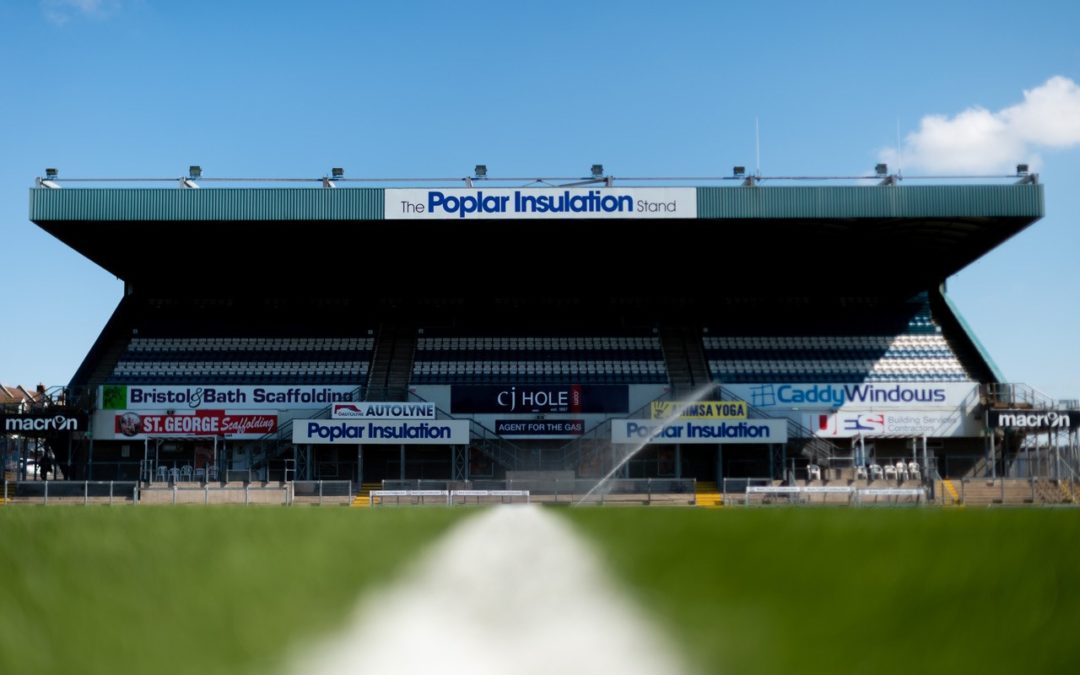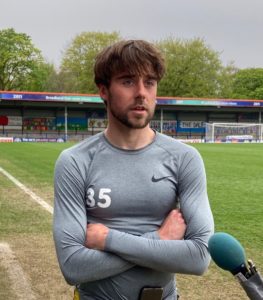Season Review 2021/22
By Stephen Byrne
Few who were present on a bright, sunny May afternoon at The Mem will ever forget the raw emotion of a quite extraordinary occasion as Rovers gained promotion back to League One at the first attempt.
Needing to beat relegated Scunthorpe United and overturn a five goal deficit to overtake Northampton Town in the League table, events unfolded with a wonderful sense of dramatic irony. Prior to the final match of the season, both teams stood on 77 points. The Cobblers, on a long trip to Barrow, scored twice early on, meaning Rovers would need a hatful of goals to stand any chance.
18 minutes in, Scunthorpe débutant Oliver Lobley fired past his own keeper to put Rovers ahead and, within four minutes, Connor Taylor had added a second. News filtered through that Northampton were three up, yet Barrow’s consolation goal on the stroke of half time from Josh Kay offered a glimmer of hope. 3-1 ahead, Northampton stopped scoring, yet Rovers produced a second half for the ages.
Aaron Collins and Antony Evans scored twice each before the latter’s deep cross, five minutes from time, was headed powerfully home at the far post by Elliot Anderson. A 7-0 victory equalled Rovers’ highest ever in the Football League and earned promotion, not on goal difference, but on goals scored. Rovers were only in the top three for five minutes all season, yet they made their way up to third tier football.
And this is only part of the story. Following a poor start to the season, Rovers’ charge up the table had resulted in several crucial fixtures. In particular, a goal down inside two minutes at Vale Park on Easter Monday, Rovers had stormed back to beat Darrell Clarke’s Port Vale
3-1. Prior to this game, Vale had lost just one of their previous 19 matches and the game was played before 10,840 spectators, including a rounded 2,222 Gas fans, Vale’s highest home crowd since the visit of Wolves in 2013.
Rochdale had lost only one of their previous 16 home League matches before Rovers travelled there for the penultimate game and Luke Charman’s first two career goals put them 2-0 up inside 17 minutes. Rovers went on to score four second half goal, Collins equalising in the final minute and then scoring the winner deep into stoppage time to complete his own hat trick. Having been outside the play offs with 20 minutes to play, Rovers approached the final game with a glimmer of hope and a suitcase full of self belief.
It had not always been that way, though. As autumn drew in, the new season opened with a certain degree of pressure on manager Joey Barton. He had two court cases hanging over him, whilst Rovers had finished bottom of League One in 2020/21 on a poor run of results.
Understandably there was a mass overhaul of players as well as staff, with assistant Clint Hill departing at the start of the campaign. The previous season’s top scorer Luke Leahy joined Shrewsbury Town, whilst Ed Upson and Abu Ogogo, who had both given sterling service to The Gas, joined Newport County and Southend United respectively.
19 players who had appeared for Rovers in the Football League left the club (two each to Gillingham and Eastleigh), whilst two others left on loan, Ben Liddle to Queen of the South and Zain Walker to King’s Lynn Town. Rovers looked toothless in attack in pre-season, until new eve of season signing Brett Pitman came off the bench to score twice in a 3-2 home victory over Oxford United, which gave huge cause for hope as the season approached.
Supporters anticipating a fresh season after the disruptions caused by the covid pandemic were able to welcome a new set of faces amongst the playing staff. 17 new signings offered hope of a new dawn: goalkeeper James Belshaw was joined by a raft of defenders in Nick Anderton, Mark Hughes, Trevor Clarke, Junior Brown, plus teenager Connor Taylor on loan from Stoke City. The midfield contained plenty of experience, in Paul Coutts, Sam Finley and especially 91cap Irish international Glenn Whelan, alongside Harry Anderson, Antony Evans and two loan signings in Barnsley’s Luke Thomas and Siôn Spence from Crystal Palace. Aaron Collins, Harvey Saunders and the experienced pair of Brett Pitman and Leon Clarke offered attacking options.
That said, a series of early season injuries wreaked havoc with the manager’s plans. Leon Clarke (hamstring), Trevor Clarke (groin), goalkeeper Anssi Jaakkola (Achilles), Alex Rodman (broken foot in training) and Mark Hughes (Achilles) were all out injured, as was Finley for a while. Question marks hung above the club as to whether Leon Clarke’s career was over, Hughes left for Plymouth in the New Year for a coaching position, and Rovers brought in striker Ryan Loft from Scunthorpe, before giving first appearances to 16 year-old Max Edwards-Stryjewski and on loan James Connolly in the FA Cup-tie at Peterborough in January.
Former QPR central defender Clint Hill, once Barton’s assistant at Fleetwood, came in as assistant manager, promptly left and joined rivals Hartlepool United in the same capacity. Supporters’ concerns with regard to manager Barton focused on two impending court cases and a perceived inability to get the best out of his players. As the season commenced, a series of increasingly bizarre comments to the press drew negative attention, notably his use of the word ‘holocaust’ following a defeat in October at the hands of Newport County. There was at this time a perceived lack of a clear game plan and questions over game management. However, on 6th December Barton was found not guilty of charges of assault against the then Barnsley manager Daniel Stendel in April 2019, and Rovers’ fortunes appeared to climb from around that point.
Any pre-season hopes of a rapid return to League One appeared to evaporate at Field Mill on the opening day, as Rovers fell to a last minute penalty at Mansfield, with captain Coutts sent off on his début, the first of two red cards he picked up this season.
Worse was to follow as The Gas conceded four goals in the opening 24 minutes in August, away to an Exeter side which had not registered a goal all season, and three in the first half at home to Orient the following month. It was after the Exeter débâcle, with Rovers having lost at that point ten of their previous 13 League fixtures, that Barton told incredulous reporters: “I know we’re going to get promoted. I have no doubt about that.”
Amidst a sea of defeats, rare victories were single goal home wins over struggling Oldham Athletic and Crawley Town. When lowly Stevenage visited The Mem, it was the former Rovers favourite Chris Lines who opened the scoring on his old stomping ground, Rovers crumbling to a forlorn defeat.
At least Cian Harries’ spectacular goal at Mansfield ended a club record run without a League goal, 584 minutes having passed since Luke Leahy had scored at Northampton Town. In the early stages of the campaign, silver linings were all supporters had to cling to.
Rovers had not enjoyed an away win in any competition during 2021 until two late goals secured victory at Walsall, Spence scoring moments after entering the field on his first appearance. In October, Evans scored Rovers’ tenth League goal of season and became the club’s tenth different scorer, his left foot strike shortly before half time inspiring a 3-0 home victory over Carlisle United; the following week he assisted both goals, as Pitman’s last gasp sublime header earned an unexpected point at Bradford City, before a seasonal highest crowd of 16,664.
Three days later, Rovers were reduced to nine men at Colchester United, Harries and Trevor Clarke being sent off late on alongside the home side’s 17 year-old defender Junior Tchamadeu, the youngest opponent ever to receive a red card against Rovers; a few weeks later, Whelan became the oldest Rovers player to receive a red card in any competition and Harries and Finley were both dismissed in a home defeat to Port Vale in December. Martyn Starnes, Rovers’ CEO since July 2018, stepped down from the rôle in November 2021 and was replaced by Tom Gorringe, who had been the club’s commercial director since 2017, and erstwhile Director of Football Tommy Widdrington left the club the following month, returning to the game as manager of National League side King’s Lynn Town.
Thereafter came a series of moments when it appeared Rovers’ fortunes had turned. Anderton’s first League strike in a Rovers shirt earned victory on The Gas’ first ever visit to Harrogate Town and high flying Northampton were defeated at The Mem, ten man Rovers coming from a goal down to secure victory. One sign that expectations amongst supporters had grown was the despair with which a point gained at Salford City was greeted, the home side having equalised in stoppage time despite being down to nine men, Matty Willock and substitute Ashley Hunter both having been sent off.
Rovers’ ability to put four goals past Rochdale twice and beat both Harrogate Town and Carlisle United 3-0 at home indicated the side’s potential. Into the New Year, Rovers were unbeaten in their first six matches, three of these featuring Rovers goals in the final five minutes, as the side gelled more and a potential if unlikely promotion push gathered momentum.
Stephen Byrne (to be continued)
All photos courtesy of Keith Brookman








